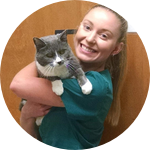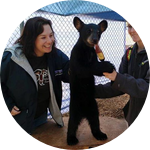About This Project
Reputation judgments allow individuals to attribute characteristics and behaviors to others without directly interacting with them. For example, an individual could avoid trusting a known cheater without having to suffer the costs firsthand. Chimpanzees and domestic dogs can attribute reputations to humans. Our study will be the first to determine if less social domestic cats can assign reputations to friendly and aggressive experimenters based on direct interactions and indirect observations.
Ask the Scientists
Join The DiscussionWhat is the context of this research?
Reputation formation, also known as 'social eavesdropping', refers to the acquisition of information by observing third-party interactions. Attributing reputation allows observers to attribute consistent behavioral tendencies to others, which may allow them to predict future behavior without experiencing the cost of a negative interaction. Humans are thought to possess the most flexible reputation formation mechanism (1). However,domestic dogs also attribute reputations in the contexts of play, competition, and resource sharing, suggesting that they possess a domain-general reputation formation mechanism (1, 2). Testing less social species, such as domestic cats, will allow us for the first time to understand whether evolving to live in social groups is a prerequisite for this ability.
What is the significance of this project?
This project will expand the growing body of research on social eavesdropping in nonhuman species by examining whether sociality impacts a species’ capacity to attribute reputations via direct experiences and indirect observations. The highly social domestic dog has been found to attribute reputations to humans based on direct experience and third-party interactions, yet their less social domestic counterparts, cats, have yet to be tested. Investigations into cats’ abilities to attend to human communicative cues have revealed that they possess skills comparable to dogs, thus, extending the comparative investigation to cats’ capacity to attribute reputations to humans is a vital next step in studying the social cognition of domesticated species.
What are the goals of the project?
The first goal of this project is to determine if cats are able to form reputations based on direct experiences. Cats will watch unfamiliar humans interact aggressively or kindly through a one-way mirror. Both cats will be given a chance to interact with each human later to determine which human they prefer approaching or spending time with. If cats form reputations (prefer the person who was friendly to another cat) we will run a 'ghost control' condition to test whether cats still attribute reputations to the friendly and aggressive human strangers when they interact with an inanimate object instead of a cat. If so, we will be able to determine that cats attend to the experimenter’s actions when forming reputations, and not to information provided from the human-cat interaction itself.
Budget
The sixty cats participating in this study will be locally recruited, and we hope to compensate cat owners for their time with $10.00 gift cards. For every $10 donated, we will be able to test another pair of cats. If you donate $10 or more, we will tell you about the behavior of the cats that you funded to participate in our project!
In order to ensure the testing rooms are clean for the cats' health and to minimize allergens in the building, we will need various cleaning and safety materials, including a HEPA vacuum, plastic mats, cat litter, and personal protective equipment for research assistants. We will also purchase an additional camera to allow us to track the attention of the observer cats.
Endorsed by
Meet the Team
Silvia Oriani
While pursuing my undergraduate degree at Penn State, I had the opportunity to work as research assistant in a comparative psychology lab studying the communicative and cognitive abilities of cotton-top tamarins. Though my interest in animals preceded my formal experience studying animal cognition, I quickly realized I wanted to pursue a career in comparative psychology as a result of my wonderful experience at the tamarin lab. After graduating, I worked as a veterinary assistant and technician at an animal hospital, which solidified my interest in caring for and studying domestic species. I am currently working on my Master’s degree as a psychology graduate student at Oakland University, where I am focusing my research on the social cognition of man’s true best friend and the most popular pet worldwide, the domestic cat.
In my spare time I enjoy taking care of my cat, nature photography, and adventuring in the woods. I aspire to complete a thru hike of the 2,100+ mile Appalachian Trail in the next few years!
Jennifer Vonk
I am an associate professor in psychology at Oakland University, but, more importantly, I am an animal lover. I have been fascinated with all kinds of animals from as far back as I can remember and I feel extremely fortunate to have a career where I now study species ranging from bats to bears to non-human primates in an effort to better understand how they think and experience the world. My work has shown that many animals are capable of forming abstract categories, recognizing kin, understanding relationships between stimuli, and attribute reputations to other individuals. I am especially interested in studying species that have been neglected by other comparative psychologists. In my spare time, I like to hang out with my many cats watching netflix. But i also like to eat out and explore new places.
Project Backers
- 19Backers
- 100%Funded
- $1,000Total Donations
- $52.63Average Donation


